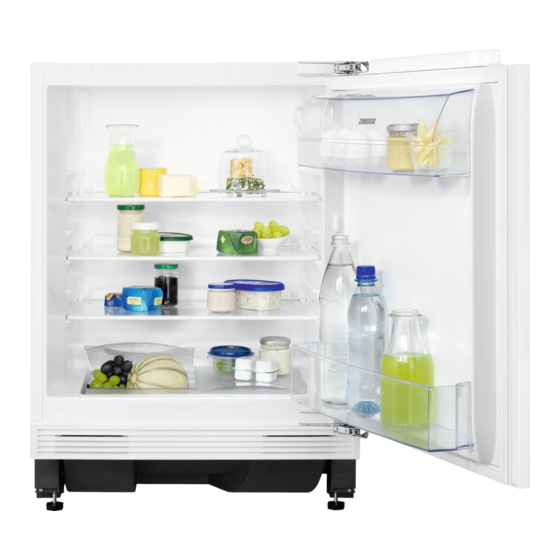Zanussi ZXAE82FR Manual do utilizador - Página 11
Procurar online ou descarregar pdf Manual do utilizador para Frigorífico Zanussi ZXAE82FR. Zanussi ZXAE82FR 17 páginas.

Problem
Water flows on the rear plate
of the refrigerator.
There is too much condensed
water on the rear wall of the re-
frigerator.
Water flows inside the refriger-
ator.
Water flows on the floor.
The temperature in the appli-
ance is too low/too high.
Possible cause
Food products are not wrap-
ped properly.
Temperature is set incorrectly.
Appliance is fully loaded and is
set to the lowest temperature.
Temperature set in the appli-
ance is too low and the ambi-
ent temperature is too high.
During the automatic defrost-
ing process, frost melts on the
rear plate.
Door was opened too fre-
quently.
Door was not closed com-
pletely.
Stored food was not wrapped.
Food products prevent the wa-
ter from flowing into the water
collector.
The water outlet is clogged.
The melting water outlet is not
connected to the evaporative
tray below the appliance.
The temperature is not set cor-
rectly.
The door is not closed correct-
ly.
The food products' tempera-
ture is too high.
Many food products are stored
at the same time.
The door has been opened of-
ten.
There is no cold air circulation
in the appliance.
Solution
Wrap the food products better.
Refer to "Control Panel" chap-
ter.
Set a higher temperature. Re-
fer to "Control Panel" chapter.
Set a higher temperature. Re-
fer to "Control Panel" chapter.
This is correct.
Open the door only when nec-
essary.
Make sure the door is closed
completely.
Wrap food in suitable packag-
ing before storing it in the ap-
pliance.
Make sure that food products
do not touch the rear plate.
Clean the water outlet.
Attach the melting water outlet
to the evaporative tray.
Set a higher/lower tempera-
ture.
Refer to "Closing the door"
section.
Let the food products temper-
ature decrease to room tem-
perature before storage.
Store less food products at the
same time.
Open the door only if necessa-
ry.
Make sure that there is cold air
circulation in the appliance.
Refer to "Hints and Tips" chap-
ter.
11
